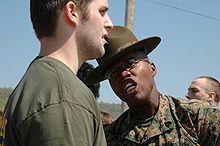
An Army Drill Sergeant, ready to teach new recruits “the fundamentals of being a soldier…”
* * * *
As noted in My Lenten meditation, I’m not giving up anything this 40 days of Lent.
Instead I plan to spend this time “contemplating on how and when” Moses wrote the first five books of the Bible. (The Torah.) But first, here’s a note about the “lead-in paragraphs.”
(The ones above “In the meantime.”)
Up to this point, those paragraphs have said the blog is about exploring “the mystical side of Bible reading.” That’s an accurate statement, but a trifle vague. On the other hand, help in curing that vagueness came to me in the form of some recent see Daily Office Readings.
 Specifically, help came from one of the “gap readings,” between February 6 and 7. That reading is 2d Timothy 2:3-4:
Specifically, help came from one of the “gap readings,” between February 6 and 7. That reading is 2d Timothy 2:3-4:
Join with me in suffering, like a good soldier of Christ Jesus. No one serving as a soldier gets entangled in civilian affairs, but rather tries to please his commanding officer. (E.A.)
(Saint Timothy is shown at right, with his grandmother.) On that note, see also On reading the Bible. That’s a post I originally published in July 2014, but recently “tweaked.” Near the end of the update, I took issue – again – with Biblical literalists.
Such literalism means “adherence to the exact letter or the literal sense” of the Bible. But to me, “literalness” doesn’t give full effect to the Bible’s frequent use of metaphor and parable. (See also On three suitors (a parable), on the “essence of the parabolic method of teaching.”)
Accordingly, I agree there is a time and place for fundamentalism, “learning the fundamentals.”
I also agree that the best place to start your “Bible training” is to take it literally:
Just like Army Basic Training, the best place to start is with the fundamentals: “This is where individuals learn about the fundamentals of being a soldier…” But no good soldier wants to be stuck as a buck private [during] his whole time “in service.” (Although there are some few [“soldiers of Christ”] who enjoy having no additional responsibility…)
In turn I concluded that this blog is for and about those Christians who want to develop into something “more than just someone who knows the bare ‘fundamentals.’”
 See also Spiritual boot camp, which talked about the words “mystic” and “mysticism,” and how they affect some people:
See also Spiritual boot camp, which talked about the words “mystic” and “mysticism,” and how they affect some people:
The words “mystic” or “mysticism” seem to give some Christians apoplexy. Try it on a Southern Baptist some time! But seriously, one online dictionary defines a mystic as “a person who seeks by contemplation and self-surrender to obtain unity with or absorption into the Deity or the absolute.” Again, arguably different words but the same idea…
All of which is a good reason to switch to Paul’s “soldier metaphor…”
There’s more on that metaphor later, but first some notes about that Lenten discipline.
I’ve noted that in writing the Torah, Moses had to be extremely careful. He had to be extremely careful because if his audience took his message the wrong way – or weren’t ready for it – he’d likely be killed. (As by getting thrown off a cliff or stoned. See Moses getting stoned.)
Jesus faced the same risk of stoning – a number of times – as shown by other recent Daily Office Readings. For example, John 8:59: “At this, they picked up stones to stone him, but Jesus hid himself, slipping away from the temple grounds.” And again in the NLT version of John 10:31: “Once again the people picked up stones to kill him.”
And Jesus Himself noted the danger – in the Gospel for February 21, the Second Sunday in Lent: “O Jerusalem, Jerusalem, who kills the prophets and stones to death those who have been sent to her!” (Luke 13:34.) And that’s not to mention Paul’s recital in Hebrews 11:36-37 (NIV):
Some faced jeers and flogging, and even chains and imprisonment. They were put to death by stoning; they were sawed in two; they were killed by the sword.
The point of all this is that anyone – up to and including Jesus – had to be extremely careful in putting forth “the Word” to people who weren’t ready to receive its full implications yet.

But getting back to the Lenten meditation…
It turns out that there’s a number of theories on when, how, or even if Moses wrote the first five books of the Bible.
For example, according to Mosaic authorship – Wikipedia, “The Talmud discusses the authorship of all the books of the Hebrew Bible and assigns all but the last eight verses of Deuteronomy, which describe the death of Moses, to Moses himself.”
Then there’s Did Moses Write Genesis? | Answers in Genesis. After noting the “Documentary (or JEDP) Hypothesis” – which the author rejected – he came to this conclusion:
There is abundant biblical and extra-biblical evidence that Moses wrote the Pentateuch during the wilderness wanderings after the Jews left their slavery in Egypt and before they entered the Promised Land… Contrary to the liberal theologians and other skeptics, it was not written after the Jews returned from exile in Babylon (ca. 500 BC)… It is the enemies of the truth of God that are failing to think carefully and face the facts honestly. As a prophet of God, Moses wrote under divine inspiration, guaranteeing the complete accuracy and absolute authority of his writings. (E.A.)
For the sake of argument, I’m assuming as well that “Moses wrote the Pentateuch during the wilderness wanderings.” But note also that the author of Did Moses Write Genesis seems to be one of those Biblical literalists I frequently take issue with.
 Then there’s From What Did Moses Compose Genesis? That article claims Moses had access to material written by “Abraham, Jacob, Noah, and even Adam.” For myself, I’m inclined to think Moses got those materials, but through oral tradition, as noted in My Lenten meditation.
Then there’s From What Did Moses Compose Genesis? That article claims Moses had access to material written by “Abraham, Jacob, Noah, and even Adam.” For myself, I’m inclined to think Moses got those materials, but through oral tradition, as noted in My Lenten meditation.
Finally – for now – there’s When did Moses write Genesis:
The Book of Genesis is traditionally attributed to Moses, writing around 1400 BCE. However, scholars now say that the Book of Genesis was really written in stages over a period of several centuries during the first millennium BCE.
I should note there’s a pretty good chance that statement – that Genesis was written by somebody other than Moses – will likely “give some Christians apoplexy.”
That in turn makes this a good stopping point. Except to say that after Basic Training, the good soldier – and by extension the “Good Soldier of Christ” – has a chance to go on to Advanced Individual Training, “where new soldiers receive specific training in their chosen MOS.”
For example, a new soldier could go to the Field Artillery Center at Fort Sill Oklahoma. (With all of the Freudian implications appertaining thereto.)
Or to the Aviation School at Fort Rucker Alabama.
Or even to the Army Intelligence Center at Fort Huachuca, Arizona.
On the other hand, a ” Not-so-good Soldier of Christ” could choose to remain a buck private for the duration. But I seriously doubt if that would “please his commanding officer…”

* * * *
The upper image is courtesy of United States Army Basic Training – Wikipedia, the free encyclopedia.
Re: “‘Gap readings’ between February 6 and 7.” The dates for Lent and Easter shift each year. (It’s a “moveable feast.” See How Is the Date of Easter Calculated?) So, most lectionaries include Daily Office Readings for a Season of Epiphany that can last up to eight weeks. But in 2016, Lent started early. Thus the “Week of the Last Sunday after the Epiphany” – which includes Ash Wednesday – came on February 7. But the readings for the week before February 7 were for the Week of the Fourth Sunday after the Epiphany. That means there’s a “gap,” in which the readings for the Fifth, Sixth Seventh, and Eighth Sunday after the Epiphany go unread in a year like 2016. On the other hand, there are other – more assiduous – “Daily Office Readers” (like me), who do all the readings, regardless of any gap. And it was from just that practice that I “re-discovered” 2d Timothy 2:3-4 – and it’s “soldier metaphor” – in such a timely manner.
Re: Biblical literaiism. See also Biblical Literalism – Huffington Post.
The image to the left of the “spiritual boot camp” paragraph is courtesy of the link, “United States Marine Corps Recruit Training,” in the Wikipedia article on Army Basic Training. The full caption: “A Drill Instructor provides an example of boot camp instructional style to a Marine Corps poolee, before the poolee’s departure for boot camp.”
The “Moses” image is courtesy of Moses – Wikipedia. The caption: “Moses holding up his arms during the battle, assisted by Aaron and Hur; painting by John Everett Millais.” For more on the Battle of Rephidim, see Was Moses the first to say “it’s only weird if it doesn’t work?”
The “Moses writing” image is courtesy of:
theosophical…evidence-that-some-of-genesis-was-not-written-by-moses.
The “Sad Sack” image is courtesy of www.coverbrowser.com/covers/sad-sack/2. See also Sad Sack – Wikipedia, an article about the fictional World War II-era soldier, an “otherwise unnamed, lowly private experiencing some of the absurdities and humiliations of military life.”
Note that I originally planned to end this post with the image below, with the caption: “An Admiral speaks to the remaining Navy SEAL trainees “at the end of ‘Hell Week.’”

That image is courtesy of United States Navy SEAL selection and training – Wikipedia. The full caption is this: “First Phase [of training:] Then-Chief of Naval Operations (CNO) Adm. Mike Mullen addresses the remaining trainees of Class 266 at the end of ‘Hell Week:'” (See also United States Navy SEALs – Wikipedia.) As to the “Hell Week” in Navy SEAL training:
The first two weeks of basic conditioning prepare candidates for the third week, also known as “Hell Week.” During Hell Week, candidates participate in five and a half days of continuous training. Each candidate sleeps at most four hours during the entire week, runs more than 200 miles, and does physical training for more than 20 hours per day.
But then I would have had to note also that the U.S. Army equivalent of Navy Seal training would be held at the John F. Kennedy Special Warfare Center and School at Fort Bragg, Fayetteville, North Carolina. “However, the latter site did not offer a suitable image for this post.”
Then too the point of that “Navy SEAL” image would have been to contrast the truly-zealous “Good Soldier of Christ” – volunteering for such training – with the slacker content to get by with just learning “the fundamentals.”
* * * *
And finally – really, really this time – note other articles of interest, to be addressed in a later post: Don Stewart :: When Did Moses Write, or Compile, the Book, Why Moses Did Not Write the Torah – Mesa Community College, and Tablets of Stone – Wikipedia.